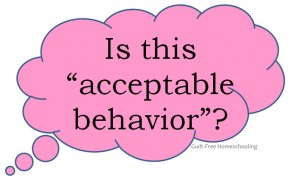[This article may not be much help to parents whose children are in total rebellion. Not having experienced that, I feel unqualified to speak to it. It is my desire to help families stop problems while they are still small, in order to prevent them from becoming huge. My son is now a sophomore in our local community college and a most wonderful young man. I will attempt to explain the changes we went through.]
You had a few beautiful babies, you survived their transitions from infancy through toddlerhood into childhood, you are now homeschooling little sponges who soak up everything you present, and life is good. Then one day one of your sweet, adorable, precious babes morphs into this mouthy, irritating, button-pushing creature that you do not even recognize most of the time. How in the world did this happen? What can you do to reverse it and get your sweetie back?
As a general rule, I did not allow sassy, mouthy comments or superior attitudes as a part of normal communication. Occasionally, we would all engage in some light-hearted teasing, but never aimed at embarrassment, humiliation, or ridicule. (If you can’t feel “safe” with your own family, where can you feel safe?) I have noticed, however, many families whose children are permitted on a regular basis to say very hurtful things in very hurtful ways to parents, siblings, and non-family members, and often without any correction whatsoever. I have many memories of gently, but firmly, pulling one of my children aside to a private conference, where I explained what I had found objectionable, what I considered a proper alternative response to be, why this behavior should not be repeated, exactly what the consequences of a repeat offense would be, and what must be done immediately as restitution.
Despite this basic training in acceptable behavior, sometime in his pre-teen years, my son gradually began mouthing off more and more often, purposely irritating his sister, and becoming generally more uncooperative to me. My husband and I tried heart-to-heart discussions, reminding him that this behavior would not be tolerated, and that helped — a little. We revoked privileges as necessary with the same results: temporary turn-arounds, but not a long-term change of heart. It seemed as though there were still times when he just had to misbehave, as if it was uncontrollable, pent-up frustration.
A couple of years before this, we had joined a homeschool co-op group where my children made new friends, we participated in many activities with the group, and we all enjoyed the fellowship. However, there were some undesirable elements in this group, but they were not other children — it was a few of the adults with exceptionally rigorous, legalistic standards. It seemed that the most unreasonable parents had especially introverted offspring and did not respond well to outgoing, fun-loving, happy children acting like children.
When one of the ultra-legalistic parents felt my son had stepped over the line on her rules governing our coop-class days, he replied that he was not aware of any wrong-doing. When I also stood up to her abusive control and supported my son, it was a breakthrough point for both of us. He was thrilled to know that Mom believed in him, and I was thrilled to know he was strong enough to stand up against corrupt authority.
We were attending a church at that time that was also less than desirable. Through several nightmarish situations, we decided to break fellowship with both the church and the homeschool group. It was like the dawning of a new day. The longer we had stayed with both groups, the worse my son’s attitude had become, only I could not see that at the time. Once we were free and the haze had cleared, I began to see that both of those groups had put an expectation on my son that boys are bad. Even though my son had a good, pure heart, the atmosphere of both places was poison to him. He was told he would be mouthy, rebellious, and a trouble-maker, and he found himself fulfilling those expectations even when he did not try to do so knowingly.
My prayer at that time was to be able to teach and discipline the boy, while still encouraging the young man within. It is a difficult transition when our sons and daughters begin to look like the men and women of their future adulthood, but think and act like the children they still are inside. A mom sometimes has to reprimand a teen-aged boy with great tact so as not to emasculate the man who will later head his own household. I tried to be especially sensitive to my son’s physical, mental, and emotional changes, speaking to him as to an adult, so as to avoid insulting his efforts to attain manhood. At the same time, I tried my best to remember that he was not yet an adult and that his occasional childlike behavior was appropriate to his age.
As we began attending a new church, we did not whine or complain about our previous situations, but quietly joined the fellowship with no “baggage.” People in the new church saw things quite differently: since my son was no longer expected to be the token hoodlum or trouble-making ringleader of the group, he did not feel the need to act out. He could relax and be himself again, without fear of anyone lurking around corners, watching his every move. He was recognized as a peer-leader in the youth fellowship and held up to all as a prime example of a fine young man (age 13). What a boost that was to his self-image! He was suddenly free of the negative cloud that had shadowed him for several years, and he felt led to rededicate his life to Jesus Christ and begin afresh. Since that time, he has grown tremendously in his personal faith, makes time every day to read his Bible, and has a strong desire to serve God in whatever capacity is available. He now has a true servant’s heart where he formerly had frustration and confusion.
My summary advice is to look outside of your currently-not-so-good child to see if there is a larger influence causing the problems. I firmly believe that children need to be allowed their small, harmless, “finding myself” rebellions so that they will not need larger ones, but sometimes they may be the innocent good apples stuck in the barrel with the proverbial bad apple. God’s guidance pulled us away from two bad influences before permanent harm was done, and I pray the same for your family, that God will guide you to break any ties that may be potentially harmful.





 Guilt-Free Homeschooling is the creation of Carolyn Morrison and her daughter, Jennifer Leonhard. After serious disappointments with public school, Carolyn spent the next 11 years homeschooling her two children, from elementary to high school graduation and college admission. Refusing to force new homeschooling families to re-invent the wheel, Carolyn and Jennifer now share their encouragement, support, tips, and tricks, filling their blog with "all the answers we were looking for as a new-to-homeschooling family" and making this website a valuable resource for parents, not just a daily journal. Guilt-Free Homeschooling -- Equipping Parents for Homeschooling Success!
Guilt-Free Homeschooling is the creation of Carolyn Morrison and her daughter, Jennifer Leonhard. After serious disappointments with public school, Carolyn spent the next 11 years homeschooling her two children, from elementary to high school graduation and college admission. Refusing to force new homeschooling families to re-invent the wheel, Carolyn and Jennifer now share their encouragement, support, tips, and tricks, filling their blog with "all the answers we were looking for as a new-to-homeschooling family" and making this website a valuable resource for parents, not just a daily journal. Guilt-Free Homeschooling -- Equipping Parents for Homeschooling Success!

Recent Comments